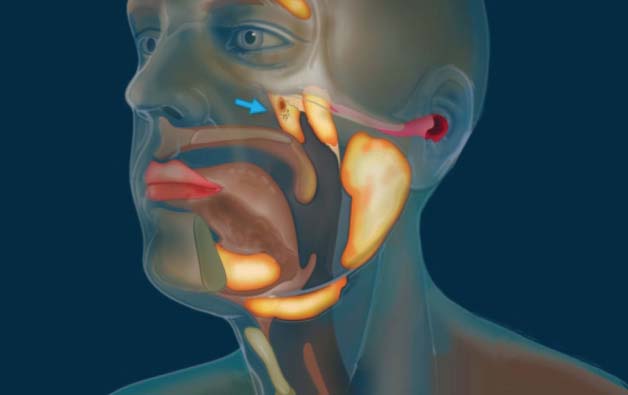
Are you suffering
from Submandibular Gland Tumor?
Don't ignore your symptoms and get immediate medical attention Today !!
Book an Appointment
Home » Surgery » Salivary Gland Surgery » Submandibular Gland
What is Submandibular Gland?
The submandibular glands are located below the jaw and secrete saliva from under your tongue. Tumors in the submandibular gland are caused by the abnormal growth of tumours or cells in the submandibular gland.
Submandibular Gland Surgery
A submandibular sialendoscopy or submandibular gland removal surgery is conducted if a tumour is found in the submandibular gland. It can also be used in cases of sialorrhea (excessive salivation or drooling). Sialorrhea can affect people with neurologic problems such as stroke or Parkinson’s disease that impair the control of muscles in the mouth or face.
When medications don’t work as expected, surgical salivary gland removal is performed to manage excessive salivation. An incision is made in your upper neck, alongside the jaw, to remove the tumor.

Causes & Symptoms of Submandibular Gland Tumour
There are several factors that can affect your Submandibular gland such as old age, radiation exposure, smoking, skin cancer, genetic, and many other health problems.
Symptoms
- A lump or swelling near your jaw
- Discomfort while swallowing
- Pain near the area of the salivary gland
- Dry mouth
- Numbness or muscle weakness in part of your face
- Difficulty in opening a wide mouth
- Pus and foul-tasting drainage into the mouth
- Fever and pain

Submandibular Gland Treatment Procedure
Doctors use surgery to access the gland and remove a submandibular gland tumour, also known as a submandibular sialendoscopy. In this procedure, they either remove the infected part or remove the whole submandibular gland.
Laparoscopic

Using the minimally invasive technique, a small incision is made in front of the ear and down the neck. The surgeon uses a nerve monitor to find the facial nerve, which needs to be protected throughout the procedure. They will separate your facial nerve and its branches from the submandibular gland tumour. Your surgeon removes the submandibular gland tumour in a biopsy if it contains cancer cells. In the end, the incision will be closed through sutures (stitches under the skin, giving an excellent cosmetic result).
Chemotherapy

If the patient is not a candidate for surgery, then doctors also use radiation therapy or chemotherapy to kill the cancerous cells through powerful radiation beams or medications, respectively.
Advantages
- The procedure is beneficial to all age groups, however, older patients with various age-related complications benefit the most.
- Low rate of surgical morbidity
- No scarring
- Lesser facial nerve damage risk
- Less pain and swelling
- Next-day discharge
- Rapid recovery
Challenges
- Due to bruising and swelling during surgery, the tongue gets numb
- Problem in moving the lips
- Difficulty in chewing or swallowing
- Infections or bleeding
- Scarring
Cost of Submandibular Gland Surgery
The cost of salivary gland surgery varies depending on the size of the tumor, the affected gland, the patient's co-morbidities, and a variety of other factors. The average cost of submandibular surgery in India ranges from 60,000 to 1,00,000 INR, including hospitalisation and medications.
Submandibular Gland Surgery By Dr. Sunil Tibrewal
Dr.Sunil Tibrewal is the perfect surgeon if problems that imaging tests, i.e., X-ray, MRI, ultrasound, etc., haven’t been able to diagnose or cure. He is one of the most highly experienced submandibular gland surgeons, having performed these advanced surgeries for more than 15 years using high-quality treatment and the latest technology.
Contact us to know more about submandibular gland surgery, the surgeries we provide, our specialties, and many more options. We are renowned for offering our patients exceptional value. We assist you at every stage and consider all the nuances of medical procedures.
Reviews & Feedbacks
Comments from people treated by Dr. Sunil Tibrewal.

Sarita Kataruka
 Very good experience with Mr tibrewal.I have undergone my appendix operation with him and i am fully satisfied with his work.Well experienced and calm.Thankyou doctor for you work.
Very good experience with Mr tibrewal.I have undergone my appendix operation with him and i am fully satisfied with his work.Well experienced and calm.Thankyou doctor for you work.

Sutanuka Bhowmik
 He is my God. He saved my husband's life. When we need help, he is always with us. Very polite doctor. Thank you Sir.
He is my God. He saved my husband's life. When we need help, he is always with us. Very polite doctor. Thank you Sir.

Archit Kayal
 Dr. Tibrewal is an excellent doctor. He operated on my mother for appendicitis. Sir is very polite and kept us well informed throughout. He also kept boosting my mother's morale throughout. We are very thankful for everything he did for us.
Dr. Tibrewal is an excellent doctor. He operated on my mother for appendicitis. Sir is very polite and kept us well informed throughout. He also kept boosting my mother's morale throughout. We are very thankful for everything he did for us.

Kritika Saraf
 Excellent Doctor.Very helpful,cooperative ndhumble.I had a great experience of his treatment.
Excellent Doctor.Very helpful,cooperative ndhumble.I had a great experience of his treatment.

Kiran Singh
 Excellent doctor, A very polite and helpful doctor..
Excellent doctor, A very polite and helpful doctor..
Why Choose Dr. Sunil
Senior Surgeon
Dr. Sunil Tibrewal (MBBS, MS, DMB, MRCH, MNAMS, FIAGES) is a qualified specialist with 15+ years of surgical experience.
Advanced Technology
Dr. Sunil Tibrewal uses modern & cutting-edge medical technologies to provide high quality healthcare services.
Complete Care
Dr. Sunil Tibrewal provides assistance and care at every step in your surgical journey i.e., from consultation to cure
Make an Appointment
Frequently Asked Questions
Will I have a scar after submandibular gland surgery?
Removing the submandibular gland through a laparoscopic process will leave very few scars. These scars fade quickly, and once fully healed, there is no recollection of the operation.
What is the recovery time after submandibular gland surgery?
Once the submandibular gland surgery is completed, you may be asked to go home the same day. It may take one or two days to recover completely and continue with your regular activities.
Will my facial nerve get damaged during the submandibular gland surgery?
Although the risk of facial nerve branch damage is high, consulting a highly experienced doctor like Dr. Sunil Tibrewal can make the whole process complication free and protect the facial nerves.
Who is one of the best submandibular gland tumour surgeons in India?
If you experience any pain or discomfort in your submandibular gland, then you must consult a doctor. Dr. Sunil Tibrewal is one of the most highly experienced submandibular gland-removing surgeons in India, and he has been performing these advanced surgeries for more than 15 years using the high-quality treatment and the latest technology.
